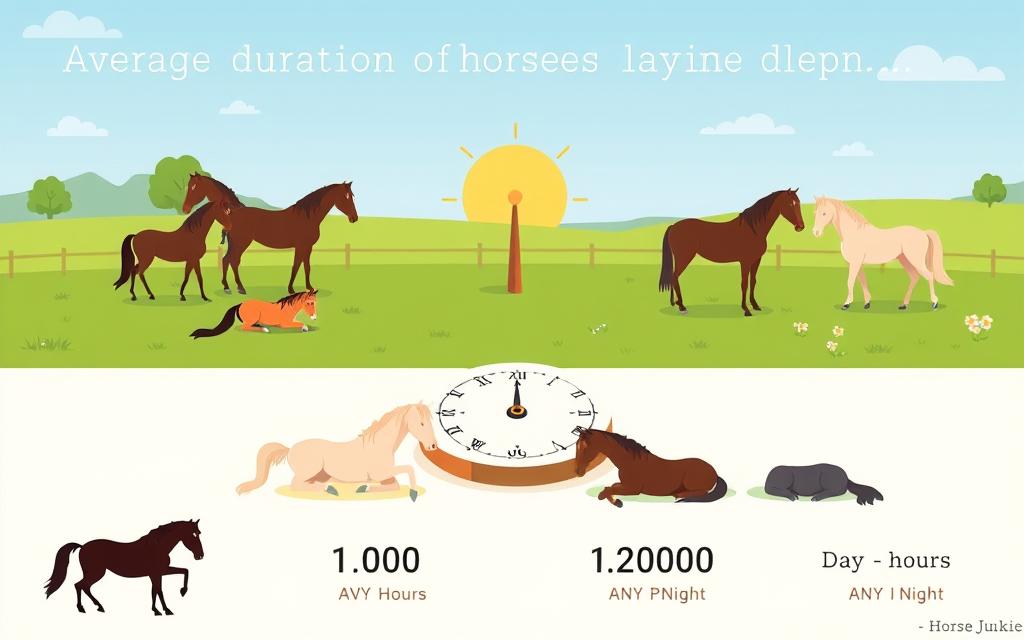Is It Normal for Horses to Lay Down? Find Out!

Ever wondered if horses laying down is normal or if there’s more to it? To truly understand our equine friends, we must explore their behaviors, like when they lay down. While horses often stand, which is key for their health, they also need to rest. This article will dive into why horses lie down and the importance of their resting habits.
Laying down is a natural part of a horse’s life. They sleep in short bursts throughout the day and night. It’s crucial to understand this behavior to ensure their comfort. Let’s uncover what’s typical and what might suggest health issues that need our care.
Key Takeaways
- Horses lay down frequently, which is a natural behavior, reflecting their need for rest and sleep.
- Changes in laying down habits may signal health issues like colic or ulcers.
- Breed-specific traits can influence how often certain horses nap or sleep.
- Weather and individual preferences can also affect laying down behaviors.
- Excessive laying down can indicate discomfort and necessitates close monitoring.
- Understanding horse behavior is crucial for ensuring their health and comfort.
Understanding Horse Behavior: Why Do They Lay Down?
Exploring horse resting behaviors shows us a lot about their natural instincts and needs. This behavior is shaped by many factors. These include their evolutionary background and their social structures.
Natural Instincts of Horses
Horses’ instinctual behaviors are key to their resting habits. In the wild, they look for safe spots to lie down. This helps them relax without fear of predators.
This instinct also builds trust among herd members. They often lie down together. This strengthens their social bonds and shows their need for a safe environment.
Resting Patterns in Wild Horses
Wild horses have unique resting patterns. They can sleep standing, but they need to lie down for REM sleep. On average, they spend one to three hours a day lying down.
Foals lie down more often, especially when they’re young. As they grow older, this behavior decreases. Factors like feeding routines and how they’re managed can affect how often we see them lying down.
The Benefits of Laying Down for Horses
Understanding why horses lay down shows how crucial relaxation is for them. This act is more than just comfort. It’s key for their physical health and mental well-being.
Physical Health and Comfort
Laying down helps horses relax their muscles and joints. This is vital for their comfort. During REM sleep, muscles relax, aiding in recovery and growth.
Ensuring our horses feel safe while resting is important. We should watch their resting patterns and behaviors. Any hesitation or discomfort might mean they’re sick.
Mental Well-being and Relaxation
The mental side of resting is also crucial. Horses that can lay down comfortably are less anxious and stressed. This leads to better behaviors and a happier horse.
Knowing when a horse has trouble laying down is key to spotting health issues. Recognizing the importance of horse relaxation helps create a better environment for them.

How Much Should Horses Lay Down?
Understanding how much horses lay down helps us see their health. They need to lay down for sleep, which is key for their well-being. We’ll look at how long they lay down and what affects this.
Average Duration of Laying Down
Many of us wonder how often horses lay down. Adult horses sleep about five hours a day, mostly standing. But, they must lie down for at least 25 minutes of REM sleep to stay healthy.
This means horses need to lay down every day. If they don’t, they risk getting hurt from falling.
Factors Influencing Laying Time
Many things affect how long horses lay down.
- Environmental Safety: Horses feel safer to lie down when they’re in a secure place. In a herd, some horses stay standing to watch for dangers.
- Management Practices: How and when they’re fed, and their living conditions, also matter. Horses that can graze freely might lay down less often.
- Age and Health: Young foals need more rest and lay down more than adults. Their sleep is important for growing.

Signs of a Healthy Horse at Rest
Watching how our horse acts when they’re resting can tell us a lot about their health. A horse’s body language when lying down is key to knowing if they’re okay. Learning these signs helps us see if our horse is feeling good and healthy.
Observing Body Language
When a horse rests, their body language gives us important clues. Healthy horses usually show:
- Relaxed posture: Legs tucked in and head resting easy.
- Movement patterns: Changing positions often means they’re comfortable, not in pain.
- Interaction with surroundings: Being calm while resting shows they feel safe.
But, if our horse seems tense or tries to get up quickly, it might mean they’re not comfortable. Spotting these small signs helps us keep our horse healthy.
Recognizing Signs of Comfort
There are other signs too that show a horse is comfortable lying down:
- Normal vital signs: A healthy horse’s temperature is 99-101.5°F, pulse is 28-44 beats per minute, and breaths 10-24 times per minute.
- Regular bathroom habits: They should pee 7-10 times a day with light yellow urine and poop 8-10 times a day.
- Hydration: Drinking 5-10 gallons of water a day is good for their health.
By watching our horse’s body language and looking for these comfort signs, we can give them the best care. This ensures they stay healthy and happy.

When Laying Down Becomes a Concern
Laying down is normal for horses, but we need to watch for big changes. Spotting the signs of a sick horse is key to their health. If a horse lies down more or has trouble getting up, look for signs of illness.
Identifying Abnormal Behavior
When checking our horses, watch for these signs:
- Lying down for more than 3 hours a day.
- Rolling or nipping at their belly, showing distress.
- Changes in how much they eat or drink.
- Struggling to get up after lying down.
If you see these signs often, it’s time to see a vet. Early action can stop serious problems.
Common Health Issues Linked to Excessive Laying
Too much lying down can mean health problems. Some common health issues linked to excessive laying are:
- Colic, caused by diet changes or other reasons.
- Muscle pain from injury or strain.
- Gut problems that cause discomfort.
- Sores or pneumonia from lying too long.
Keeping our horse healthy is important. Regular vet visits, shots, and watching them closely help. Spotting problems early can help our horses stay well.

The Importance of a Safe Environment
Creating a safe space for horses is key to their comfort. Horses, being prey animals, need both physical and emotional safety. This ensures they can rest well and get the REM sleep they need for health.
Creating Comfortable Sleeping Spaces
To make a cozy spot for our horses, we need to focus on a few things:
- Clean, dry bedding that keeps them warm and comfy.
- Enough room for them to move freely without feeling trapped.
- Protection from loud noises and harsh weather to keep their rest uninterrupted.
When horses feel safe, they’re more likely to rest deeply. This is good for their health. In a herd, horses often lay down each day.
Stabling Considerations for Horses
Stabling horses right is also crucial for their safety. Important aspects include:
- Good airflow to keep the air clean and prevent breathing problems.
- Keeping the temperature just right to avoid discomfort in extreme weather.
- Adding familiar items or friends to help them relax when resting.
It’s important to be careful around resting horses. We should build trust so we can sit or lie down with them. By meeting these stabling needs, we create a caring space that helps them rest better.

How to Encourage Healthy Resting Habits
Creating a calm and predictable environment is key for our horses’ happiness. A regular routine helps them feel secure and relaxed. By setting up a structured space, we meet their natural needs.
Routine and Structure
Having a daily routine is vital for our horses. It gives them a sense of stability and what to expect. This includes set times for eating, playing, and resting.
This structured life reduces stress, making them feel safe. Young foals often nap a lot, showing how important rest is. As they grow, they still need regular naps for their development.
Importance of Social Interaction
Horses love to be around others, which is crucial for their happiness. Letting them socialize with other horses helps them relax. This is especially true on sunny days when they often lie down together.
Being with friends makes them feel secure, helping them rest better. Also, providing soft bedding and enough space in their stalls makes them more comfortable.

Debunking Myths About Horses and Laying Down
Learning the truth about horses and their sleep habits clears up many myths. Misinformation can cause worry about our horses’ health.
Common Misconceptions
Many think horses only lay down when they’re sick. But, horses lay down often to rest and sleep deeply. They rest in different ways, like lying flat on their chests or sides, not like cats or dogs.
Another myth is that horses need a lot of sleep. Actually, horses sleep in short bursts all day. This keeps them alert and safe in the wild.
The Truth About Horse Sleep Patterns
Horses need to lie down for REM sleep to stay sharp and healthy. This deep sleep is key for their well-being. Even though they sleep only a few hours a day, these short naps are important.
Older horses or those with joint problems might find it hard to lie down and get up. This can mess with their sleep. Making sure our horses have a safe place to sleep is crucial. Without enough sleep, they might not perform well or could get hurt.

Seeking Professional Advice
As horse owners, we must watch over our horses’ health closely. Knowing when to call a vet is key, especially if our horse acts strangely while resting. Signs like lying down too much or seeming uncomfortable could mean serious health issues.
When to Contact a Veterinarian
Regular vet visits are important for our horse’s health. If our horse’s resting habits change a lot or they can’t stand for long, call a vet right away. A vet can spot health problems and suggest the right actions. Knowing our horse’s needs helps us care for them better.
Understanding Equine Health Experts’ Role
Equine health experts are crucial for our horses’ well-being. They offer advice on food, environment, and behavior. Working with these experts helps our horses stay physically and mentally healthy. This way, our horses can be happy and healthy in any setting.
FAQ
Should horses lay down regularly?
How often do horses lay down in a day?
Do horses sleep standing up?
What are the signs of a sick horse?
What is the importance of relaxation for horses?
What equine comfort signals should we look for?
What factors influence how much a horse lays down?
How can we create a safe environment for horses to rest?
How can we encourage healthy resting habits in horses?
What are some common misconceptions about horses laying down?
When should we seek professional advice for our horses?
Source Links
- Horse Laying in Field – sleeping?
- Horses can’t lie down for too long – Farm and Dairy
- Why Do Horses Lay Down and What Does it Mean When a Horse Lays Down?
- Why Does a Horse Lie Down?
- Why Is My Horse Lying Down?
- The truth about lying your horse down — Don Jessop
- Down in the Dirt – Western Horseman
- Horses Stand Up to Sleep but Lie Down Perchance to Dream
- Nap Time! When and Why Young Horses Lay Down & Sleep
- Recognizing a Healthy Horse
- When is lying down a bad sign?
- Lying Down More Than Normal, or Getting Up & Down
- Down Horse
- How Do Horses Sleep? Top 5 Facts About Horse Daily Sleep!
- Laying Down On or With a Horse – Stable Horse Training and Rehabilitation
- How do Horses Sleep?
- How do horses sleep?
- Nap Time! When and Why Young Horses Lay Down & Sleep
- How Horses Sleep – Snooze Schedules and the Stay Apparatus
- How do horses sleep? | Petplan Equine
- The Equine Enigma: Can a Horse Sit Down Just Like Dogs? | Dream Horse
- Understanding Unique Sleep Patterns in Horses
- Horse Training Tip: The Reason Behind Laying Horses Down
- Horse Management Practices, Sleep Quality, and Performance
- Horses’ Use of Lying Halls and Time Budget in Relation to Available Lying Area






